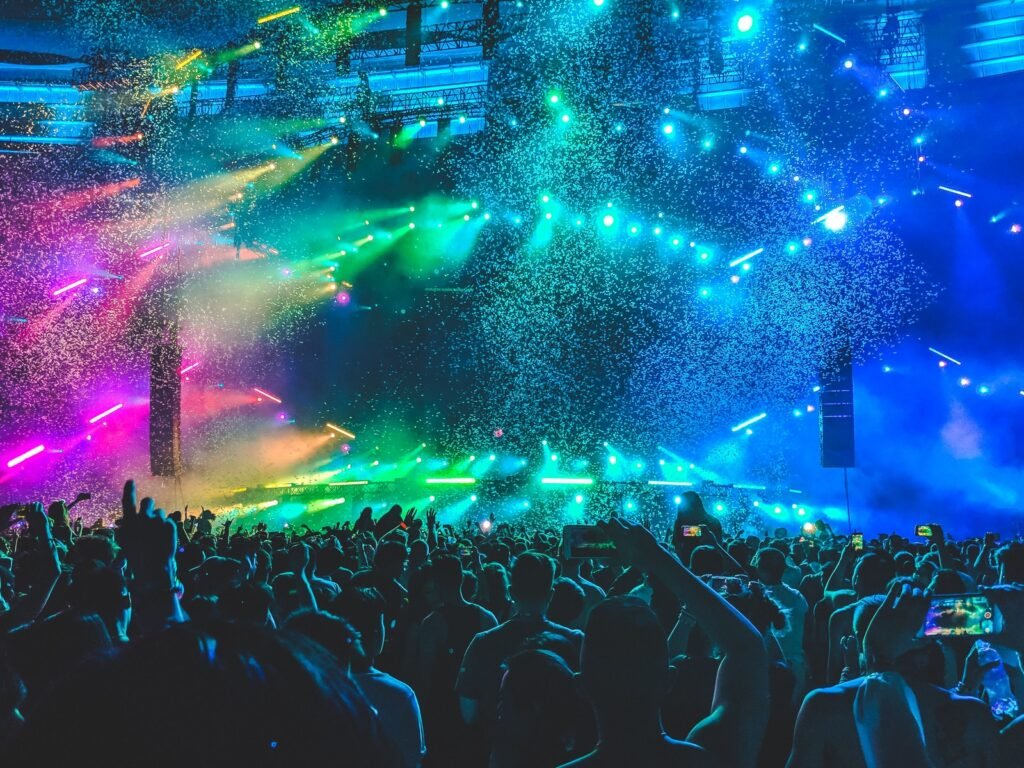I recently ran a trial session that asked participants to choose five songs that moved them in some way. We then spent ninety minutes exploring how those songs related to the challenges they were facing at the moment. Read on to learn what I discovered. The results were truly astounding!
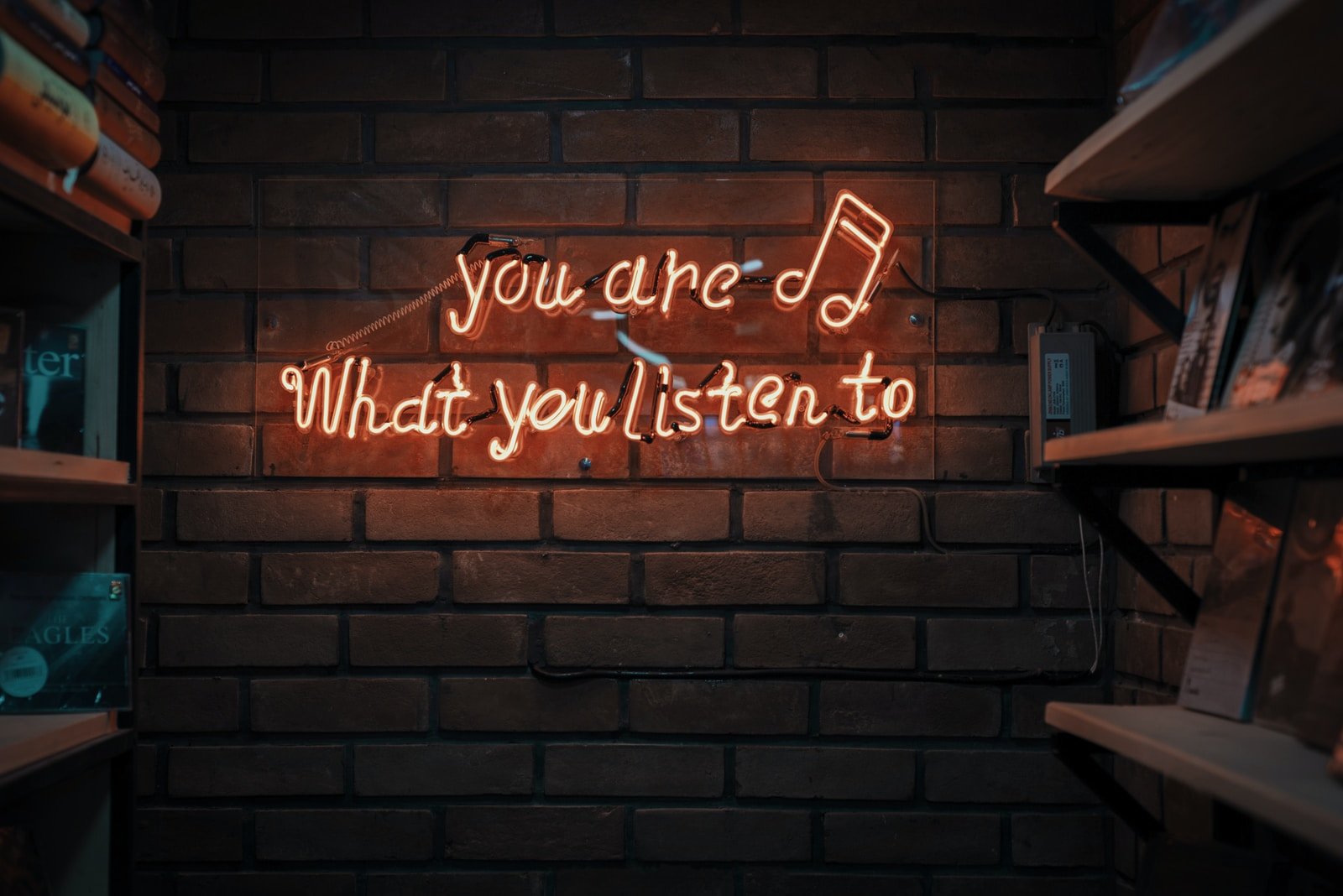
Introduction
Introduction to the Concept, How Music 'Moves' Us in Different Ways, Summary of Observations


Observations
How We Relate to Music, How We Use Music To Define Our Identity, Using Music to Process Emotions or Change Emotional State


Applications
Increasing Focus, Deepening Self-Awareness, Exploring Purpose, Nourishing Innovation, Deep Listening
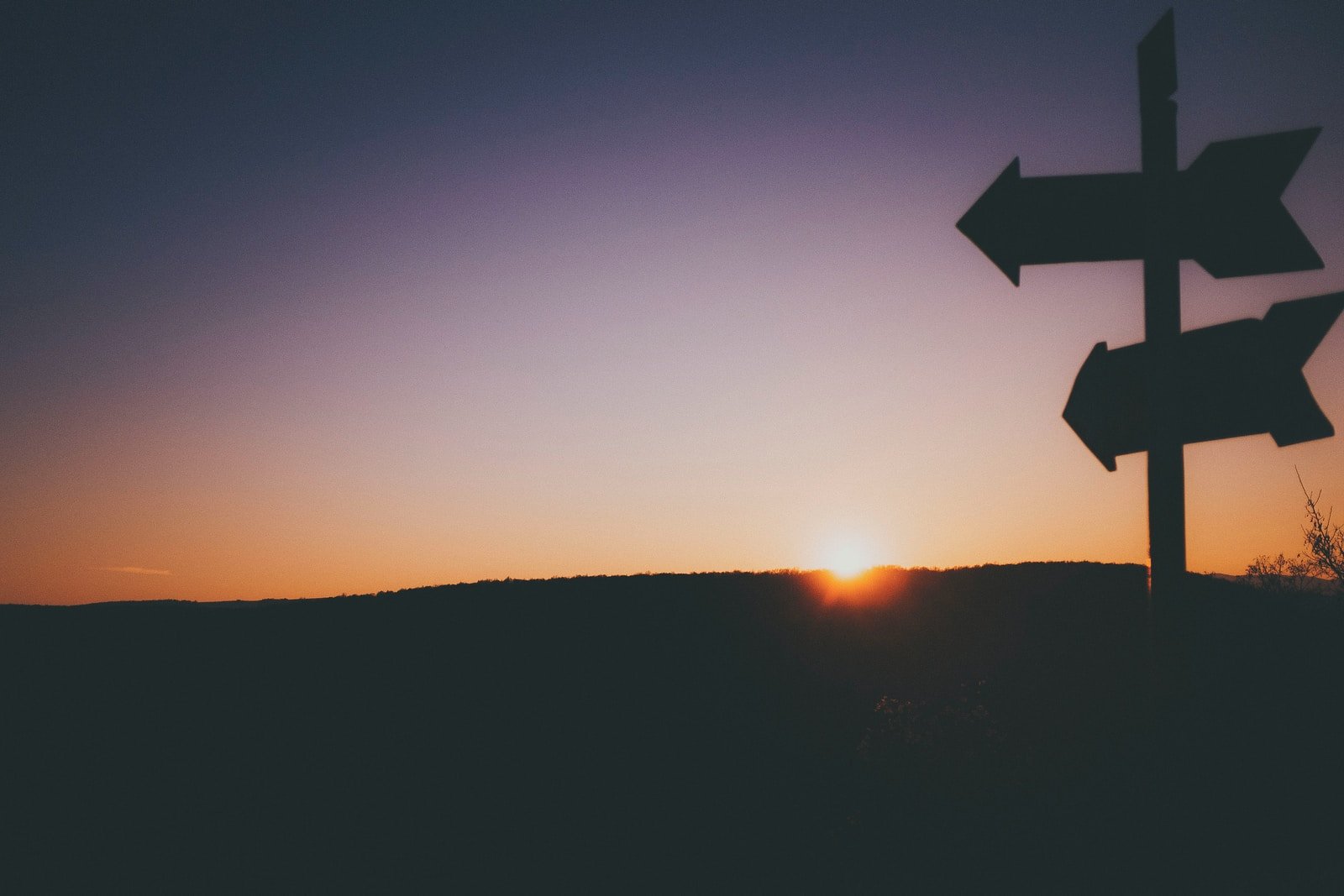

Next Steps
Areas For Further Research, How To Apply These Learnings, Coaching Partnerships
What Does It Mean To Be Moved By Music? [How Did I Do This]
Why, Why, Why, Delilah? - [Why Did I Do This?]
As mentioned above, participants were briefed to choose ‘five songs that move you in some way’. This was voiced with deliberate ambiguity to invite unrestricted pondering.
For what is it to be moved? Is it the infectious four-to-the-floor dance floor stampede, throwing shapes and drinks with reckless abandon? Or a movement to tears, of joy or catharsis, a gratitude for what is, and who was, and how life’s curve balls can drive us round the bend, or sail us merry towards the sunset?
The participants interpreted ‘movement’ to mean all, or a combination, of the following:
- Dancing
- Singing
- Laughing
- A sense of peace
- Tears
- Physical transcendence
- Frisson (the technical term for musical goosebumps)
- The whispered (or hollered) invitation to dance in public or private
- A connection, a re-magnetising of one’s link to internal infinity; a weaving into the fabric of the moment, surrounded by like-minded vibrations
- An emotional release. To which road does the unencumbered expression of tears guide us? May we find catharsis not critique in the strength it takes to concede one’s resolve and melt into pure feeling.
- An internal shift to the majesty of our true nature. Esteem, awakened from slumber, revels in the righteous inheritance of congruence and cavorts with fluid aplomb.
- A moment of relaxation, permission to be, the rat race circuitry meanders to safety, shedding the skin of busyness, to bask for a moment in the eternal sunshine of knowing
- A movement to focus.
To be moved can be interpreted literally, as moved to external action, or to be moved internally. Either way, movement is different to thinking. When we are thinking, we don’t necessarily move.
I believe it is important to allow ourselves to be moved, by which I mean putting ourselves in a situation where we are not in control.
The language centres of the brain possess no capacity to control the movement of the body. And the movement centres of the body possess no direct capacity to produce or understand language. It is only through training that we become able to influence and communicate the meaning behind our movements.
David Bowie once commented, “I don’t know what I’m doing half the time.” – can’t find quote
This is as much a study of listening habits as it is a glimpse into our listener’s subconscious.
Articulating Our Experience Of Music
I expect there are many things contained here that are obvious. As I was writing and collating what I observed, I certainly felt the same. “This seems so obvious, do I really need to write about it?” As I conducted more sessions, I started to realise what is obvious and clearly articulated by one person, may also be present, but not necessarily articulated for another. And sometimes, whole new ways of thinking can emerge from bearing witness to the musical experiences of others.
People’s relationship to music can be very spatial and dynamic. Through synaesthesia, our listening experience can provide answers in a visual form. A single line, or section, or moment in a song, can come to define an entire moment. Just as a picture speaks a thousand words, a song can speak volumes about our place in the universe.
Music has been with us all through our lives. It is ingrained in who we are. Perhaps there is nothing new to learn here, but instead, the gift of remembering. And if nothing else, music is a fabulous medium for remembering.
[Call To Action]
Using Music To Support Change
Change can be intimidating because in order for new beginnings to exist, certain things must end. There is an inherent grieving process in change. Whether it is getting rid of a favourite piece of clothing because it is worn out, moving house, or letting go of limiting beliefs, in each instance, something we held dear is no longer a part of our life. Change is a lot easier to contemplate when we know we have something new to look forward to in the future. We go shopping for a new garment, we have a new house lined up, we imagine the new mindset we wish to adopt. It’s much harder to give away a piece of clothing or a home without a replacement lined up, just as it is hard to let go of a belief or behavioural pattern without a compelling alternative.
Music makes the process easier. It helps us tap into what’s really important to us. It offers solace. It provides a guiding light when everything else is uncertain. Adolescents have such tenacious attachment to their music because it helps them define their identity when everything else in their world seems to be changing. There is a reason why the music of our formative years often holds such significance, it was the soundtrack to change.
Although this process is borne out of necessity, many details are accidental. So how do we purposefully change our soundtrack?
It is also amazing just how many songs we forget or fall out of favour with. Our soundtrack seems to go through seasons. Some songs are evergreen, others only reappear as relevant at intermittent times in our life.
Think the propensity towards melancholy after a breakup, or a bereavement. Or the seeking out of a romantic vibration in the first throws of a new love. We turn to these songs in times of need to deepen our experience.
I see them as different to the songs we listen to all year round. The songs that express our identity and give us strength.
[Some thoughts here. After the initial session, someone is then informed as to how to categorise their music in a different way. Subsequent sessions are playlist building exercises]
A meaningful life is defined by or constrained by our relationship with change. Anything that makes uncertainty easier to deal with is an asset.
The difference between feeling stuck, and feeling in control of one’s life often comes down to articulation. When our actions are the result of unexpressed and often conflicted feelings, we sense an incongruence in the way we are living.
Music has the gift of making the intangible, tangible. Of expressing the inexpressible. In the cathartic wake of such clarity, we are served with the words and images to define our current experience, and from that place we start to piece together a vision of the destination we would like to move towards.
Observations
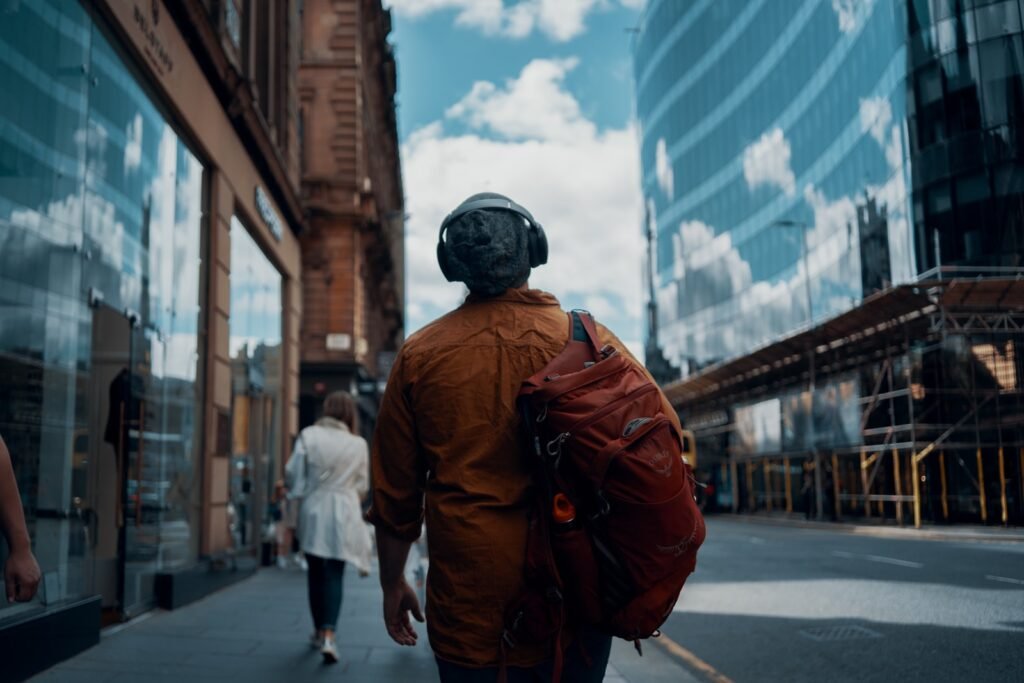

Summary of Observations
- Music tends to have physiological effects on us that we can quantify with some objectivity, and emotional effects which tend to be more subjective.
- We experience music in similar ways, and yet our subjective experiences vary greatly. Hence why we gravitate towards different genres or styles of music. Everyone has their own unique sonic ‘fingerprint’.
- Music can help us process and channel our emotions.
- Music can also change our state.
- Music is an inseparable part of our identity, both as individuals and the culture of society.
- How we listen music is just as important as what music we choose
I have split my observations into two groups: the physiological effects of sound, and the emotional effects of music. Music has the potential to be comprehensively immersive (when we are open to it), affecting us physically, cognitively and spiritually at the same time.
When we are fully open to music it affects us physically, cognitively and spiritually. But so often these days when we experience music through headphones, it is literally “only in our heads”.
Although we often care passionately for our music, much of our relationship with it is often unarticulated.
Just as we become more caring for those around us when we apply conscious attention to our actions, when we give a narrative to our experience of music, we become aware of the nuances of our love for it.
Music is the intuitive structuring of sound into coherent experiences. As will all mastery, achieving an intuitive understanding takes meticulous study.
I see our larger mission as a global community to unite. Very broadly speaking, we have a population in the East that are experience- and intuition-orientated, operating on feel. And a population in the West who are analysis- and logic-orientated. Jonathan Sacks in his wonderful book The Great Partnership, outlines the convergence of these two perspectives to be instrumental in the harmonious future of the planet. He also posits that the different perspectives draw a parallel with the model of the brain as having a right and left hemisphere, some people identifying stronger with a logical, analytical way of operating, or an intuitive, feeling way of operating.
I believe that in order to facilitate the bridging of these two hemispheres, each ‘culture’ must take steps to meet the other in the middle.
The same is true to deepen our relationship with music. There is pure bodily experience, rapture, direct connection to the sublime. And there is also the science of rapture, why do certain songs transport us to such wonderful places and others leave us cold. What are the core similarities in the ways we are effected by music? And what are the subtle nuances that define our unique sonic footprints?
With this in mind, one half of the future of this research follows a scientific path of repeatable and measurable results, and the other follows a more creative path, transmuting one’s personal unknowns into certainty by offering them up to the scrutiny of intuitive feeling.
The Physiological Effects of Frequency & Tempo
Using Music And Sound For Focus and Performance
The physiological effects of sound tend to occur on an unconscious level. This can be through conditioning: a fire alarm instigates a state of alertness; a lion’s roar activates our fight or flight response. Or it can be a result of resonance. Certain frequencies resonate freely within us, and quite literally open parts of us to the moment.
Think sound baths, Tibetan sound healing,
Physiological effects seem to function, regardless of whether there is an element of soul to the performance. They are the body’s response to sound. However, when the science of sound, unites with deep soul connection, the results are pure magic.
For the purposes of this sharpening focus, I will not discuss the physiological effects of sound in this post. You can read more about harnessing sound in this post: [link to the physiological effects of sound post]
What is Emotion?
Emotion is traditionally associated with weakness. That ‘to show emotion’ is to not deal with something in a pragmatic and productive way.
But emotions are a natural part of our human experience and it can be argued, emotion underpins all our actions. There is a reason why we respond to stories and songs, they speak to our emotional centres. Logic and language can define action, but they are unable to create it without an internal emotional buy-in. When we feel stuck, it is because our words and thoughts are not aligned with our emotion, our ability to act or express ourselves in the world.
Emotional Relationship to Music
I summarised that where music relates to emotion, we use it in two subtly different ways.
I define emotion here as one’s internal emotional state. Although I would also like to broaden the interpretation of emotion to cover any call to movement, be it physical or internal.
We are filled with emotion when we approach the dance floor and start dancing.
- To meet the emotion we are feeling and amplify it. Allowing ourselves to feel it more deeply and achieving a cathartic release, processing and expressing it.
This surfaced in times of loss or grief and also in times of joy. Although grief is painful, it is still classed as a positive emotional experience. Where we are struggling to grieve, meeting grief with music can support us to follow through with the process. - To deliberately change our emotional state; bringing ourselves in touch with more of our resources through listening to music.
This could be as simple as getting going in the morning. Listening to a empowering piece of music before a job interview. Etc.
The Listener's Relationship To The Artist
It arose several times that the song was a representation of an artist the listener held as a role model. In some ways the actual song from the repertoire was immaterial, it was the reminder of the connection to the traits and style of the artist which were important.
The Interpretation of Songs: Psychoanalysis in Music
What Do Our Musical Tastes Reveal About Who We Are?
Music can serve to unite a group of people. Perhaps that is its most potent gift to humanity. Seeing a 100,000 moving in time with another is reminiscent of the cellular cooperation that exists within any organism.
I often wonder why a certain song will suddenly jump into my mind. For me, it is often a repeating lyric, but it can also be the experience of hearing part of the music in my mind’s ear. At this moment I start to get curious about what the trigger was. And if that trigger was external (something in my environment reminded of the song) or internal (is it an expression of my internal emotional state).
Of course, it would be very easy to say, “It’s just music. It’s just entertainment. It doesn’t mean anything.” But I really think that if we can interpret dreams or visions as messages from the subconscious, music most certainly also belongs in that category.
Hey Soundtrack, Who Am I?
Expressing The Inexpressible
Music is a portal to be able to expect those darken corners of our life experience which can so often elude logical explanation. The transcendence offered by any art work, is an invitation for imagination. A place where we can see ourselves from further away than words might customarily allow.
“Frankly, I mean, sometimes the interpretations I’ve seen on some of the songs that I’ve written are a lot more interesting than the input that I put in.” – David Bowie
Why Do I Like What I Like?
First off, any answer to this question will never honour the kaleidoscopic wonder of the human listener.
Love At First Listen: A Lyrical Paradox
Is any song truly unique? For if it were, a brand new, relatively alien collection of vibrations, we would most likely struggle to warm to it. “Ahead of its time,” they might say in retrospect. “Dear Marty McFly, we’re not ready yet. But give us a couple of years and we’ll catch up.”
Every new piece of music borrows elements from what has gone before. Like a lego set of musical building blocks, contemporary artists rearrange them into structures that resonate with the modern world. Some structures survive the test of time; the winds of change do not render them obsolete. Others become ghost towns, wispy tumbleweed vibrations visited only by the niche and stalwart.
Imagine for a moment: a good friend shares with you a playlist of eleven songs you’ve never heard before. Upon first listen, two songs stand out. You might make out a few of the words, or you might be drawn to the vibrations. The other songs are nice to listen to, but haven’t hooked you in quite the same way as those fabled two.
A couple of weeks later, we get curious about the lyrics, perhaps we find ourselves in absence of the recording, absent-mindedly singing the melody in the shower. Cue a Google search and scan of the words. Now here, one of two things happen, but it’s generally the first one. We either read the words and it deepens our conscious appreciation of the song, or the words reveal that the song dones’t represent us and we become less attracted to it
Let’s assume we have the first reaction: our appreciation of the song grows after we look at it more closely.
Herein lies the lyrical paradox: are we attracted to a song subconsciously because our brain hears the lyrics on a subconscious level and resonates with them? Or do we attribute and make meaning out of the words because we have heard the track many times already?
What is the nature of our attraction to this song?
Why is it important? What we choose to believe is what makes us who we are. By auditing our favourite music, we can gain a clearer insight into who we are choosing to be and then reflect on whether that conglomeration is who we really want to be.
Further Areas For Exploration
As difficult as it is to study, I am curious about what music we don’t like. Music that rubs against and frustrates us in some way. Sometimes this is contextual, ie. music not to conducive to working or study. Other times there is a pattern, and I believe those patterns might reveal hidden elements of ourselves.
How Music Can Support Your Personal Growth
- Anchoring: Using music as a placeholder to access memories and tap into desired past states.
- Use of frequency playlists to influence brainwaves, tapping into flow states and deep focus.
- Familiarity and rapport building. Talking about certain things can be difficult. Speaking about experiences with musical support can make the process easier.
- As an aid to imagination. Music, and art in general, expressed the intangible, thoughts and feelings that don’t translate when communicated linearly.
- As reference points for the coaching conversation. The songs, or reference to the music, serve as points both thinking partners can refer back to over the course of the engagement.
- As an aid to express feelings for catharsis. Where the blockage is not a limiting thought, but instead an obstruction to feeling, music can lead the way to cathartic expression.
- The use of music for innovation and for opening up creative avenues of exploration and new ideas.
- As an emotional barometer, to become more aware of our internal processes, and exercise the capacity to consciously change how we are feeling.
- As an affirmation of identity. The chance to express oneself and understand deeper how one’s musical soundtrack is an expression of values and motivations.
- Prescription of music outside of the coaching space to enhance physical performance, facilitate personal growth and deepen connection with oneself and those around.
- To build awareness in our sense of ritual and gratitude. Music can be both the easier and the hardest thing to ignore.
Music For Performance


…or do we focus and achieve our best through carefully curated tempos and frequencies?
You may be familiar with Binaural Beats or Isochronic Tones (if not, here’s a link to playlist on Spotify: LINK).
Increasing tempo tends to make our hearts beat faster. It’s exciting, we respond by exerting more energy. There is a great deal of research that proves that short term performance can increase by listening to fast, energetic music. Perfect for running and fitness classes, but what about more sustained feats of physical endurance?
What about mental endurance?
How do the performances of others enhance our own performance?
Harder, Better, Faster, Stronger
Has the song you’re listening to ever ended just as you arrive home? To what extent does setting a deadline or an ETA, set a tempo?
Runners, cyclists, professional power walkers, drop me a beat to move my feet, faster with focus.
Cognitive Lift
Where do we find focus? Embedded commands
Music For Purpose
“By Now You Should’ve Somehow Figured What You Gotta Do”
Lately, I have been reflecting in some depth on my history of musical infatuation. Some of my tastes have changed, others have remained the same. Recent conversations have prompted a more thorough recapitulation of how music has both enhanced and defined the different epochs of my life. It has been particularly intriguing to explore the songs and artists that featured heavily in the various stages of my formative years.
I say here stages of my formative years because there was quite a distinction between when I fell in love with pieces of music just because of how they sounded, and when I started to associate music with social situations and a sense of belonging to a certain social group.
Why did I choose to listen to certain songs? What was I getting from them? How did they give me strength? Why did I reject certain styles of music?
From these musings emerged the Musical Timeline Exercise. How has my personal playlist evolved or changed over the course of my life so far? What drew me to certain artists? What songs have I forgotten? What can I learn from myself through observing the patterns of my listening over time? How do these patterns relate to my true motivations; the real me; my unwavering life purpose?
Music & Ritual in a Streaming World
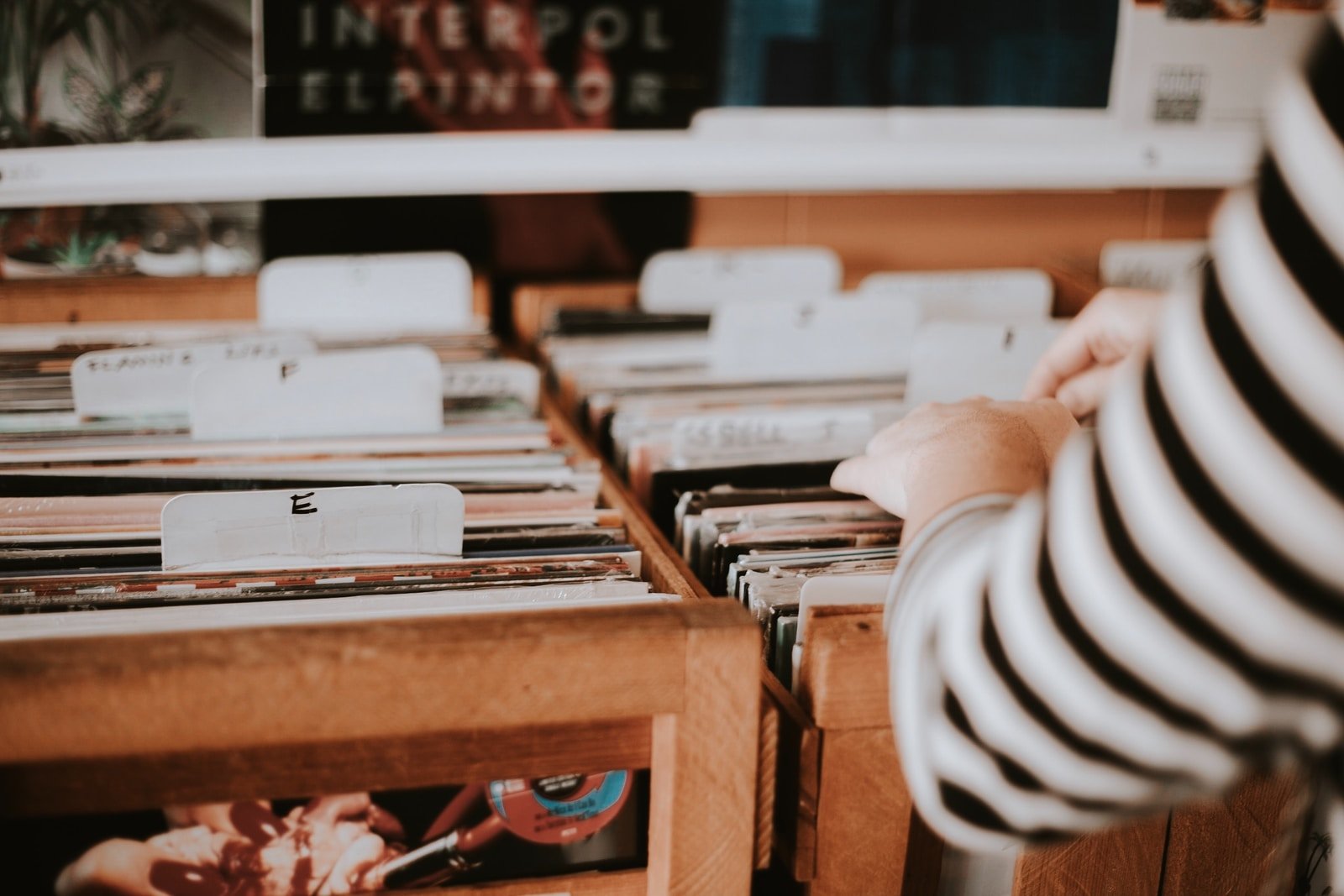

Music is ubiquitous in the modern world. As commonplace as water or money, it is a language, a resource, but to define it only in those terms is to serve short the aces it deals with every illuminating listen. And yet, in the absence of enforced ritual – we press the button and hear the sound – music can often wash over our heads, rather than resonate through our bodies. And when connection to the soul is in drought, we are constantly carrying a debt to ourselves, a lack of deeper connection.
Call it a remedy, with no need for prescription. And yet, a white noise placebo might serve the same, should we close our ears to its heavenly games.
Listening habits are absolutely fascinating places to explore who we are as people. You may not have given much thought to how you experience music, or perhaps the subtly different ways that your friends experience it.
My recent conversations have been dappled with pangs of nostalgia. Listening to the Top 40, poised to hit the ‘record’ button and capture my favourite song on cassette tape. Playing chicken with the DJ hoping not to besmirch my recording with a chundering retort, shattering the symphony, left fluttering through my mind.
All this a far cry from the present day primal scream of 24/7 audio graffiti that can parch those hard-wired for daily stillness.
Some have returned, college vinyl in hand, clutching to chest one’s favourite sleeve. Smiles shine bright, waiting for the needle to drop. If nothing else, at least the vinyl record, cassette tape, the CD, they all came to a natural conclusion. But Spotify, Tidal, YouTube or any manner of digital playlist, has the capacity to vibrate eternally.
In a world where everything we could desire is at our fingertips, how do we create rituals and cultivate gratitude? When things go right, we barely even notice, but when our expectations are not met, we can be thrown irrationally into disarray.
Perhaps the way we consume music is the way we consume everything? By becoming more conscious of our listening habits, perhaps we can open up awareness of other unconscious patterns in our lives?
I Want To Deepen My Connection To Music
There are several contributing factors which have potentially separated us from pure connection with music.
- We tend to listen to music on headphones a lot these days. We listen with the entire body, not just the ears.
- MP3’s and standard streaming formats have stripped away a lot of the frequencies that enrich our listening experience.
- The Coronavirus pandemic put serious limits on live music. Live music is more potent, more vibrant than any recording. It is a brand new experience. A similar comparison, a freeze-dried instant coffee you make at home compared with a fresh ground coffee from a barista.
- Listening is one experience. Going deeper into the music, by singing or playing along offers another level of experience. Unfortunately, there is a common narrative in society that discourages amateur engagement with music. If you feel compelled to express yourself, go for it! Don’t let the perceived quality of your expression halt you. No artist sounded great when they first started. Music development is personal development.
Where Do We Go Now?


Exercises To Try
Using Music To Retrain Attention/Create Ritual
The world moves at a very fast pace. It takes conscious effort to create and stick to boundaries around our time. Work can make its way into our homes, more often than ever in these days of increased remote working.
Music always used to be delivered with a sense of ritual. From religious ceremonies, to radio broadcast scheduling, to live performances, there is anticipation, and that anticipation primes us to receive the experience.
Create a Playlist to Express Who You Are To A Complete Stranger
Try to include songs that reveal all aspects of yourself without censor. The temptation can be to present a particular side of who we are, but this exercise is far more powerful when we reveal those songs which we might term ‘guilty pleasures’, or tracks we prefer to listen to in private. Don’t worry you don’t have to share the playlist with anyone. It is solely for your own personal exploration.
Given the vastness of this subject, I see endless possibilities for self-exploration and understanding through studying one’s personal soundtrack. Music is so ingrained in who we are, through repetition, through cultural conditioning, and through conscious choice, it is the rudder which steers our every day. But we are not always aware of why it is steering us or where we are allowing ourselves to be directed.
Since music is framed as entertainment in society, or ingrained rigidly in ritual, it isn’t always a natural step to explore how it defines who we are.
Is it as simple as changing your soundtrack to change your life?
I don’t think ‘all change’ is the answer, but blowing the whistle on routine trains of thought can bring us back on track. The desire to run away and start afresh tends to come from a place of fight-or-flight, it is not a rational response to the desire for change that we experience. There is a saying, wherever I go, I will still be there.
As a vehicle for deeper personal understanding, music is a door to personal awareness. Both through developing our sense of ritual and boundaries in a 24/7 world. And through consciously choosing a soundtrack that serves the myriad nuances of our unique purpose on this earth.
Further Areas For Exploration
Exploring in more detail the effects of different tempos when walking and running. Everyday movement to tempo.
Playlist Links
I’ve gathered together the songs from the sessions so far and curated a playlist. Does the music that moves others also move you?
Click here to listen to playlist from all the sessions so far: [link to Spotify playlist of sessions so far]
Would You Like to Learn More?
As a music-inspired coach, my work is my vocation. I love working with interesting and committed individuals excited to embrace their true purpose. Musical exploration is rich with metaphor and can be very visual. If you identify as a very analytical person, you might find the process challenging and unnatural. But equally, a fresh perspective might break open up your thinking.
My mission is to make self-exploration a fun and exciting experience.

